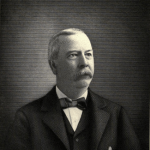
The rapid development of all material resources during the closing years of the nineteenth century has brought business enterprises up from the day of small things to gigantic proportions, where millions of dollars take the place of hundreds and where men are required to handle millions as coolly, as carefully and as successfully as their grandfathers handled hundreds. All the history of the world shows that to grapple with all new conditions, to fill breaches in all great crises men have been developed and have stood ready to assume new and great responsibilities and have discharged them well and profitably. Many youths now taking their first lessons in practical business will work up gradually from one responsibility to one higher, and then to still higher ones, as did Amasa B. Campbell, Idaho’s great mining magnate, and will be, as he was, the right man for the place, when, in the march of advancement, the place is ready and they are needed in it.
Amasa B. Campbell is a son of John and Rebecca (Snodgrass) Campbell, and was born in Columbiana county, Ohio, April 6, 1845. His father, a native of Pennsylvania, died in Illinois in 1845, aged forty-five years, and his mother, whose life began and ended in Ohio, died in 1892, at the age of eighty-six. Mr. Campbell’s boy-hood was passed in his native county, where he attended public school until he was seventeen years old. Then he went to Alliance, Ohio, where he entered the employ of the firm of Pettit & Nixon, commission merchants, as a clerk. There he remained five years, gaining a thorough and practical knowledge of business and the methods best calculated to insure its success. He went west in 1867, where he was employed by the Union Pacific Railway Company until 1870. His work here gave him broader ideas of business and fitted him to consider larger and more important commercial and financial propositions than had been represented to him hitherto. He was drawn away from the employment, however, by the mining excitement which was then beginning to make Utah the Mecca of venture-some men who sought to achieve fortune by a short cut, and he went to the country in 1871 and was engaged in prospecting in Utah, Colorado and Idaho until 1882. At that time he returned to Ohio and located at Youngstown, but, as events have proven, not with the intention of giving up mining. He remained there five years and, meantime, in association with John A. Finch organized at Youngstown a syndicate of capitalists to purchase and operate mining property in the Coeur d’Alene country, Idaho. Those who are at all informed concerning the mining history of the Coeur d’Alene district know that Mr. Campbell’s enterprises and their successes have made him one of the leading mining men of the great west and that through his influence and exertions some of the greatest mining properties in the world have been developed, have yielded their treasures for the enrichment of Idaho and the improvement of the commerce of the nation and have long afforded and are now affording profitable employment to thousands of men.
A self-made man in all that the term implies, Mr. Campbell has won his great success by legitimate methods and by the exercise of sagacity, foresight and business capacity of the highest order, and another factor potent in his successes has been labor, early and late, hard and unceasing. In his views of affairs of public moment, Mr. Campbell is a Republican, adhering strictly to the principles of that party as enunciated by Abraham Lincoln. But in Lincoln’s time the silver question, as it is now understood, had not arisen, and Mr. Campbell believes, with Senator Teller and other distinguished Republicans of the west, that he made no departure from Republicanism when, as delegate to the national Republican convention, at St. Louis, in 1896, he with Senator Teller and others, refused to sup-port the gold platform, and left the convention hall. Mr. Campbell has risen to a high place in the Masonic fraternity. Education has ever commanded his best thought, and his dearest wish is for the thorough and general education of the American people. In recognition of his interest in this subject, so vital to our national progress, he was in 1899, appointed by Governor Steunenberg a member of the board of regents of the University of the State of Idaho, but fearing that his important private interests would prevent his giving due attention to the duties of this office he declined it appreciatively but firmly.
In 1890 Mr. Campbell married Miss Grace M. Fox, of Youngstown, Ohio, and they have a daughter, named Helen. They lived at Wallace from 1890 to 1898, but have since had their home at Spokane, Washington.

